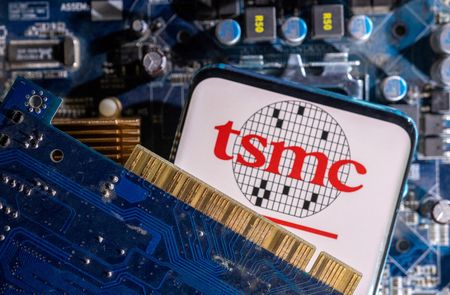By Sarah Wu and Ben Blanchard
TAIPEI (Reuters) -Taiwan’s TSMC said on Friday it expects to receive permission from the United States to supply its China plant with U.S. chipmaking tools indefinitely, in an easing of Washington’s restrictions on foreign chipmakers operating in China.
The U.S. Department of Commerce’s Bureau of Industry and Security (BIS) has advised TSMC to apply for the “validated end-user” (VEU) programme, which would allow the chipmaker to receive exports without separate approvals, the company said in a statement to Reuters.
“We expect to receive a permanent authorization through the VEU process,” TSMC said, noting that it did not previously need to apply for VEU status.
Taiwan Economy Minister Wang Mei-hua said earlier on Friday that TSMC has received the waiver from the United States to supply U.S. equipment to the company’s factory in China.
Last October, the Biden administration published a sweeping set of export controls, including a measure to cut off China from certain semiconductor chips made anywhere in the world with U.S. tools, vastly expanding the reach of a bid to slow Beijing’s technological and military advances.
South Korea’s government said this week that Samsung Electronics and SK Hynix will be allowed to supply U.S. chip equipment to their China factories indefinitely without separate U.S. approvals.
TSMC, the world’s largest contract chipmaker, said last year it had been granted a one-year authorisation by the United States that covered its factory in Nanjing, China, that makes less-advanced 28 nanometre chips.
The company, a major Apple Inc supplier, also said in the statement that it has received U.S. authorisation to continue operating in Nanjing while it applies for VEU status.
However, the United States is continuing efforts to cut China off from top AI technology and plug gaps in export controls.
Reuters exclusively reported on Thursday that the Biden administration is considering closing a loophole that gives Chinese companies access to American artificial intelligence (AI) chips through units located overseas.
The United States last year shook relations with Beijing when it unveiled new restrictions on shipments of AI chips and chipmaking tools to China, seeking to thwart its military advances.
TSMC’s Taipei-listed shares closed up 0.6% on Friday, outperforming the broader market which dropped 0.3%.
(Reporting by Sarah Wu and Ben Blanchard; Editing by Sonali Paul, Muralikumar Anantharaman & Simon Cameron-Moore)

